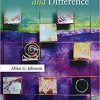(eBook PDF) Understanding Deviance: Connecting Classical and Contemporary Perspectives
$50.00 Original price was: $50.00.$35.00Current price is: $35.00.
(eBook PDF) Understanding Deviance: Connecting Classical and Contemporary Perspectives – Instant Download
(eBook PDF) Understanding Deviance: Connecting Classical and Contemporary Perspectives – Digital Ebook – Instant Delivery Download

Product details:
- ISBN-10 : 0415642612
- ISBN-13 : 978-0415642613
- Author: Tammy L. Anderson
First, in 12 separate sections, she presents a wide range of deviant behaviors, traits, and conditions including: underage drinking and drunk driving, doping in elite sports, gang behavior, community crime, juvenile delinquency, hate crime, prison violence and transgendered prisoners, mental illness, drug-using women and domestic violence, obesity, tattooing, sexual fetishes, prostitution, drug epidemics, viral pandemics, crime control strategies and racial inequality, gay neighborhoods, HIV and bugchasers, and (lastly) youth, multicultural identity and music scenes.
Second, her pairing of “classic” and “contemporary” viewpoints about deviance and social control not only “connects” important literatures of the past to today’s (student) readers, her “connections framework” also helps all of us see social life and social processes more clearly when alternative meanings are accorded to similar forms of deviant behavior. We also learn how to appreciate and interact with those who see things differently from ourselves. This may better equip us to reach common goals in an increasingly diverse and ever-changing world.
Table contents:
- Functionalism, anomie, general strain theory
- Social disorganization and collective efficacy
- Social pathology, degeneracy, and medicalization
- Labeling, resistance, and edgework
- Stigma, carnival, and the grotesque body
- Deviant careers, identity, and lifecourse criminology
- Moral panics and risk society
- Critical criminology, culture of control, mass incarceration
- Critical race theory, multiculturalism, and identity
- Biomedicalization, biopower, and biocitizens
People also search:
understanding deviance and contemp
understanding deviance connecting classical and contemporary perspectives
dimensions of deviance
how does conflict theory explain deviance
how does conflict theory define and explain deviance


